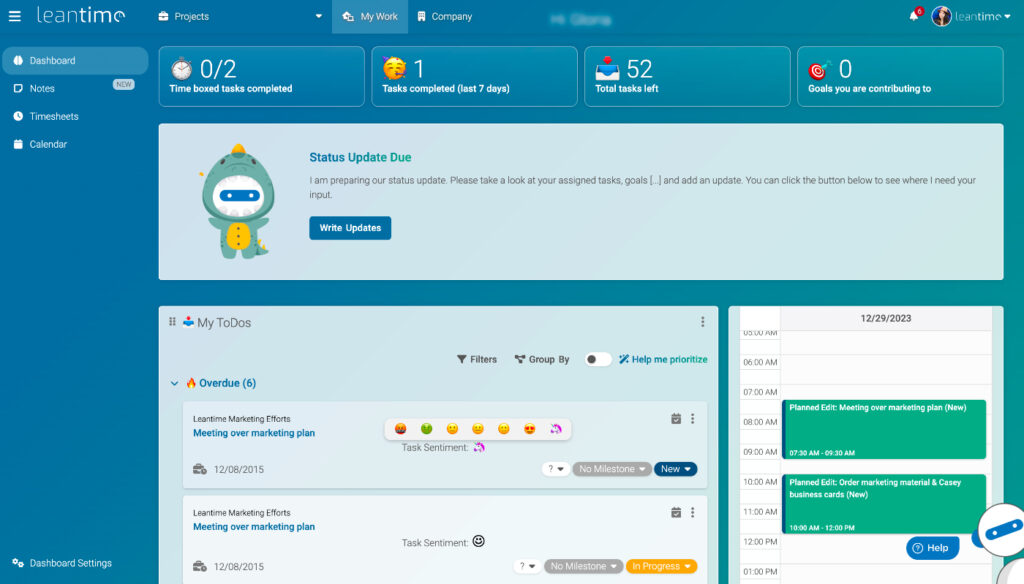Running a successful startup is similar to playing chess. It requires careful planning, strategy, and foresight.
In order to make a well-informed decision, it is crucial to evaluate all the potential consequences and how your actions may impact the future. This principle also applies to startups. Unfortunately, several entrepreneurs tend to neglect the significance of project management when setting up their businesses for success.
Project management involves using various methodologies, processes, and tools to plan, organize, monitor, and control the workflow of a project. It includes project planning, resource management, time tracking, cost estimation, team collaboration, and risk management.
Learn how project management software can benefit startups. Discover all you need to know below.
Table of Contents
- The Importance of Project Management for Startups
- Key Advantages of Startup Project Management
- Challenges Faced by Startups
- Choosing the Right Methodology for Your Startup
- Essential Startup Project Management Tips
- Effective Use of Project Management Tools
- Top Project Management Tools for Startups
- Establishing a Scalable System for Managing Projects
- Summary
Key Takeaways
- Project management is critical for startups, offering organization and efficiency while helping avoid common pitfalls and ensuring resource optimization and accountability.
- Choosing the right methodology, like Agile, is pivotal for a startup’s success, providing structure and adaptability, but other methodologies should be considered based on the startup’s specific needs.
- Utilizing effective management tools and techniques, along with encouraging cohesive work among team members, is vital for startups. This is coupled with the need to set realistic goals and milestones to guide and track progress.
The Importance of Project Management for Startups
Every startup begins with a brilliant idea, but turning that idea into a successful business is a whole different ball game. That’s where project management comes in. The secret weapon gives startups the direction, efficiency, and productivity they need to navigate their unique challenges.
Project management, led by a skilled project manager, involves project planning and:
- Accomplishing the right tasks in an optimal manner
- Understanding where resources are being allocated
- Assessing the return on these investments
- Setting attainable timelines
- Monitoring advancement
- Making data-driven decisions to propel your startup.
Key Advantages of Startup Project Management
The question arises: why should startups devote resources to project management? One compelling reason is they offer an organized framework to arrange and sequence project activities. This keeps the teams on track and working well together, even when handling multiple projects.
Moreover, structured planning and organization can prevent common pitfalls for startups by spotting potential risks early and tackling them before they escalate into significant issues. It also ensures that resources are used in the most efficient and productive way, ultimately saving money.
And let’s not forget about accountability and continuity, which are crucial for keeping the business wheels turning.
Challenges Faced by Startups
Despite the undeniable advantages of project management, startups face unique challenges when dealing with complex projects. Limited resources often make teams and budgets super tight, while undefined processes can lead to confusion and inefficiency.
Add to that the need for flexibility to accommodate shifting business objectives, and you have a tricky balancing act on your hands. Furthermore, startups, often lacking in experience and dealing with scalability issues, find project management intricate yet indispensable to their operations.
Choosing the Right Methodology for Your Startup

The success of your startup can hinge on the selection of the appropriate project management methodology. The right methodology provides a solid structure that can boost productivity, speed up growth, and ensure adaptability to changes, which are quite common in the startup world.
One of the most applauded methodologies for startups is Agile, which promotes flexibility, encourages open communication and fosters a sense of shared ownership among team members. However, it’s worth examining the Agile approach more closely and contrasting it with other prevalent methodologies.
Agile Approach for Startups
Agile methodologies, such as Scrum and Kanban, are ideal for startups because they encourage teamwork, iterative cycles, and adaptability to change. They’re particularly beneficial when you clearly understand your requirements and can tackle tasks sequentially.
Scrum
Scrum is a popular Agile framework that helps teams break down large tasks into smaller, more manageable ones called sprints. It is designed to promote collaboration, flexibility, and regular feedback, which can help teams identify any issues early on, adapt to changes in the project, and maintain quality control.
Although Scrum is mainly associated with Agile and Scrum development teams, it can be adapted to suit any project. Its continual improvement and iterative development principles make it ideal for startups that face rapidly evolving customer needs, emerging technologies, and fierce competition.
Kanban
Kanban is a project management tool that organizes tasks on boards in columns, visually representing all the moving parts of your projects. With Kanban boards, you can label tasks, prioritize them, and assign team members for each job.
Adopting a workflow-centric approach, startups can break down large projects into smaller tasks and track milestones at each step. This helps teams stay on top of their deadlines, quickly adapt to changing requirements, and align tasks to deliverables.
On the other hand, Kanban uses a visual board to track tasks and progress, keeping the workflow transparent and efficient.
Waterfall
The Waterfall method is a project management approach that follows a structured and linear step-by-step process. It comprises of five sequential stages: conception/initiation, analysis, design, implementation, and maintenance. During each stage of the project lifecycle, teams monitor their progress and document deliverables. They only proceed to the next step once the current one is finished.
This approach works best for projects with clearly defined requirements and low chances of changes during the project. It enables a startup to identify and eliminate potential risks early on by creating a clear roadmap. However, it lacks the flexibility that Agile methodologies offer.
Comparing Popular Methodologies
While Agile is a popular choice, other methodologies like Waterfall and Critical Path Method (CPM) also have their merits. The Waterfall approach, for example, provides a clear plan and helps identify risks early on, but its lack of flexibility can be a drawback for startups. Agile project management, on the other hand, offers more adaptability in response to changing requirements.
The Critical Path Method helps identify the minimum time needed for a project by pinpointing the most critical tasks. However, like Waterfall, it follows a linear sequence, which might not be the best fit for startups that need to adapt quickly to changing circumstances.
Essential Startup Project Management Tips

In addition to selecting an appropriate project management methodology, adhering to some vital guidelines can significantly contribute to your startup’s success. These include setting realistic goals, prioritizing tasks, and encouraging cooperative teamwork.
Let us further unpack these valuable tips.
Setting Realistic Goals and Milestones
Establishing achievable goals and milestones is an integral component. It not only provides a clear direction but also helps maintain motivation by allowing you to track progress and celebrate wins.
To ensure that the goals are achievable, startups should start with manageable objectives and gradually expand as they gain more experience. Regularly reviewing these goals is also crucial to ensure they remain aligned with the startup’s evolving objectives and market conditions.
Prioritizing Projects and Tasks
Another fundamental facet is the prioritization of projects and tasks. By focusing on the most crucial tasks first, startups can maximize productivity and ensure that important tasks don’t fall through the cracks.
Techniques like the ABCD task-management method, which involves categorizing tasks into different priority levels, can be particularly helpful. This not only helps in organizing tasks but also aids in decision-making, planning, and scheduling.
Fostering Team Collaboration and Communication
Last but not least, promoting teamwork and transparent communication is essential. This not only promotes innovation but also enhances problem-solving and project success. Utilizing team collaboration software can greatly contribute to these goals.
It is crucial to create an environment where everyone feels comfortable sharing their ideas and feedback. This can be achieved by encouraging diversity and inclusion, setting common goals, and building a work culture that values teamwork and trust.
Spot and Address Risks Promptly
It’s crucial to be on the lookout for potential issues early on in your projects. Spotting a problem? Tackle it immediately instead of postponing it for later. If you wait too long, that small snag could grow into a major hurdle that’s tough for you and your team to overcome. So, stay vigilant, regularly check the key metrics of your project, and handle risks while they’re still small and manageable.
Effective Use of Project Management Tools

They can revolutionize operations for startups as a project management solution. They can streamline processes, boost productivity, and improve communication, making it a breeze for project managers with the right task management tools.
Read More: Boost Your Productivity with Effective Task Management
However, not all tools are created equal. The effectiveness of these tools largely depends on their features and how well they align with your startup’s needs. Let’s examine the essential features to consider in tools and evaluate some of the best options available for startups.
Core Features to Look For
When evaluating project management tools, there are a few core features you should prioritize. These include task management, prioritization, collaboration, alerts, and tracking.
Task management allows you to organize and track the progress of various tasks, while prioritization ensures that the most critical tasks are completed first. Collaboration features facilitate team communication and document sharing, while alerts and tracking features keep everyone updated on project progress.
Top Project Management Tools for Startups
Plenty of tools are available, but some stand out as particularly well-suited for startups, including the best project management tools, such as Leantime, which is considered one of the best project management software.
Startup project management software can transform startups’ operations, offering a streamlined approach to handling tasks. It boosts productivity, enhances communication, and simplifies the coordination process, making it easier for teams to achieve their goals efficiently.
Features include:
- Work Overview
- Note Taking
- To-do Lists
- Calendar Imports
- Personalized Dashboards
This provides all the tools you need to manage your projects efficiently. Ultimately, the choice of tool should depend on your specific needs and budget.

Leantime
Leantime is a work management system that caters to individuals with ADHD, ADD, and dyslexia, promoting inclusivity in the workplace. Its features are designed to boost dopamine and motivation while prioritizing readability.
Read More: ADHD-Friendly Tips for Regaining Focus and Productivity
Whether you’re a startup, working in a product team, or working for a digital consulting agency, Leantime can adapt to your unique workflow. This project management tool helps you stay organized all year round with its structured project management tools, intuitive to-do lists, and time-tracking features. All of these are designed to enhance focus and productivity, catering to various work styles and needs.
Leantime is an open-source project management tool designed for people who manage projects but may not identify as traditional project managers.
Establishing a Scalable System for Managing Projects

As your startup expands, your system should have the capacity to scale proportionally. Implementing a scalable project management system involves documenting processes, investing in training, and being adaptable to change.
Let’s delve deeper into these crucial elements.
Documenting Processes and Procedures
Creating detailed documentation of processes and procedures is crucial in building a system that can efficiently handle increasing project demands and complexities. It ensures consistency, aids in training, and offers a blueprint for efficient use of management software for startups.
Creating a process documentation guide might seem daunting, but it’s a critical step towards scalability. This guide should include all the steps involved in your processes and any necessary templates or forms and should be regularly reviewed and updated.
Investing in Training and Development
Another vital component involves investment in training and development for effective resource management. By investing in training, businesses can build skilled startup teams, optimize processes, and better manage expectations.
Read More: Startup Success: Key Tools for Business Development
Providing ongoing training programs and encouraging certifications can be extremely beneficial. These programs enhance your team’s skills and promote project management consistency and efficiency.
Summary
Managing projects effectively is far more than a trendy concept for startups—it’s a cornerstone for thriving in a competitive environment. Key steps include grasping its significance, selecting an approach that aligns with your vision, applying practical tips, and utilizing the right tools.
These efforts, combined with building a flexible and robust system, empower startups to skillfully steer through the entrepreneurial journey, setting a steady course toward achieving their aspirations.



